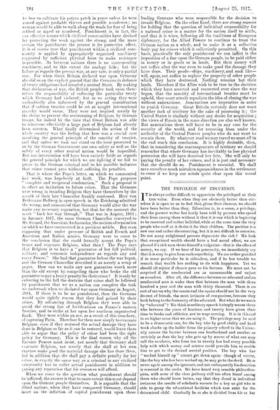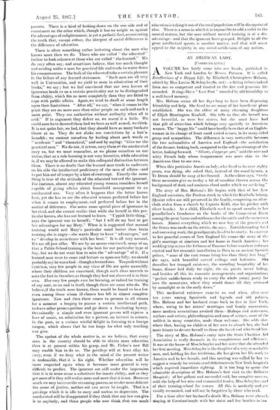THE PRIVILEGE OF EDUCATION.
JT is always rather difficult to appreciate the privileged at their true value. Even when they are obviously better than our- selves it is open to us to feel that, given their chances, we should have been better than they. Education is, in a sense, a privilege, and the present writer has lately been told by-persona who spend their lives among those without it that it is one which is beginning to be resented and rather belittled, while at the smile time the very people who scoff at it desire it for their children. The position ie a new one and rather disconcerting, but it is not difficult to conceive. Do not many enlightened persons depreciate the rich ? We look that exceptional wealth should have a bad moral effect, we are pleased if a rich man shows himself a vulgarian—that is the effect of money, we say. If we hear of his generosity, we immediately say that it is easy to give from such superfluity. We are rather gratified if in some particular he is ridiculous, and if ho has trouble no remark that wealth has nothing to do with happiness. let we should all rejoice if chance gave us his fortune. We must not be surprised if the uneducated are as unreasonable and unjust as ourselves. After all, the difference between an-educated and an uneducated man is wider than that between the man with three hundred a year and the man with thirty thousand. There is no sort of reason why the curate-and the squire should not be the very dearest of friends, the most intimate of companions, because they both belong to the fraternity of the educated. But-what do we mean by "educated" ? We think inordinary speech iteimply means these who between the years of fourteen and twenty have given their time to books and athletics, not to wage-earning. It is in this and in no higher sense that we are using it. The privilege may be said to be a democratic one, for the boy who by good ability and hard work climbs up the ladder from the primary school to the Univer. city crosses the barrier between one brotherhood and another as certainly as does the boy who gets up by means of what one may call the escalator, who from ten to twenty has had every possible help with which money and science could provide him to enable him to get to the desired mental position. The boy who has "worked himself up" cannot get down again—though of course, like the boy who has been worked up, he may go to the devil. He is never again among the ignorant, and not unfrequently his desertion is resented in the ranks. We have heard very sensible philanthro- pieta, with none of the class jealousy still too often famish among those who should know better,-say that they dread in individual instances the results of scholastic sweets for a boy or girl who is able to grasp the educational facilities which now exist for the determined child. Gradually lie or she is divided from hie or bur
parents. There is a kind of looking-down on the one side and of resentment on the other which, though it has no weight as. against the advantogesof enlightenment, is yet a pathetic fact, accentuating the truth that, except colour, the sharpest of social differences is the difference of education.
There is often something rather irritating about the man who knows more than we do. Those who are called "the educated" incliue to look askance at those who are called" the learned." We do very often 88y, and sometimes believe, that too much thought and reading unfits a man for practical life and tends to water down his common-sense. The bulk of the educated take a certain pleasure in the failure of any learned statesman. "Such men arc all very well in Universities, and we yield to none in admiration of their books," we say ; but we feel convinced that our own leaven of ignorance lends to us a certain practicality net to be distinguished from ability, which fits us more completely than they are-fitted to cope with public affairs. Again,we tend to dwell at some length upon their limitations. " After all," wo say, "when it comes to the point they are no more sure than other people on such-and-such a moot point. They are authorities without authority when all is told." If in argument they defeat us, we resent it a little. We could soon have downed them had we been as well armed, we think. It is not quite fair, we feel, that they should have so many booksto throw at us. They do not shake our convictions by a hair's- breadth; we content ourselves by hurling about such words as " academic " and "theoretical," and end by saying: "Give me the practical roan." We do not, it is true, envy them as tile uneducated envy us, but wo must remember, as we plume ourselves on our virtue, that as a rule learning is not very lucrative, while education is, if we may be allowed-to make this colloquial distinction between them. There is no doubt that the learned man tends to underrate on his gide the intellectual proficiency of the man of affairs—and to put him out of temper by a hint of contempt. Exactly the same thing is true of the attitude of the educated toward the ignorant. For instance, almost any educated young woman considers herself capable of giving advice about household management to an uneducated one. Very often it happens that the latter knows beet, yet she has to see the educated woman preferred before her when it comes to employment, and, preferred before her in the matter of deference. She notes some special piece of ignorance in her rival, and she cannot realize that while she herself in this par- ticular knows, she has not learned to learn. "Uppish little thing," says the ignorant one to herself; "but I will do my best to get her advantages for my Mary." When it is suggested that manual training would suit Mary's particular mind better than brain training she is angry—she wants Mary to have " advantages," not to "develop in accordance with. her bent." It is all very natural. We are all just alike. We are by no means convinced, many of us, that a Public School training is the best for our particular type of boy, but we do not want him to miss the " advantage " of it.. If a learned man were to come and lecture us upon our folly, we should probablysay he was a fool—though a learned one. To speak without cynicism, very few people in any class of life are quite unworldly where their children are concerned, though each class marvels to note the fact in theother,as though they had not observed it in their own. Also very few people care for learning, or indeed for training of any sort, as an sod iu itself, though there are some who do. We believe,if the truth were known, there would be found to be a few even among those whom ill-chance has left in almost complete ignorance. Now and then there comes to persons in all classes for a moment a longing to pursue a certain intellectual path, to leave other preoccupations and go' down a fascinating byway. Occasionally a simple and even ignorant person will express a love of music, an admiration for a. picture, an interest in science, is the past, or a curious wistful delight in listening to a foreign tongue, which shows that Ire too, longs for what only teaching can give.
The upshot of the whole matter is, as we believe, that every man in the country should be able to obtain store education than is at present within his grasp, and Mr. Fisher's new Bill may enable him to do so. The privilege will at least allay his envy, even if we deny what in the mind of the present writer is undeniable, that it is his right. Whether education will be more respected again when it becomes more general is very difficult to predict. The- ignorant are still strider the impreaaion that it is in some sense a substitute for innate ability, and as they get moreof it they will realize more and more that it is not. However much we may increase the reasoning-powers, or render more delicate the sense of justice, mother-wit can. never be taught. That is .a privilege which it is idle to envy. and trustees to depreciate. The. tmeducatedwill be disappointed if they think that any law can give. it to- anybody, and thew people who now think that. too muck education is taking it out of the rural popula tion will be disappointed also. There is a seam in which it is impossible to-add a cubit to the mental stature, but the. num without mental training is at a dis- advantage—and that the ignorant have grasped. Delight in all the great intellectual quests is another matter, and that will never appeal to the majority in any social subdivision of any nation.



























 Previous page
Previous page